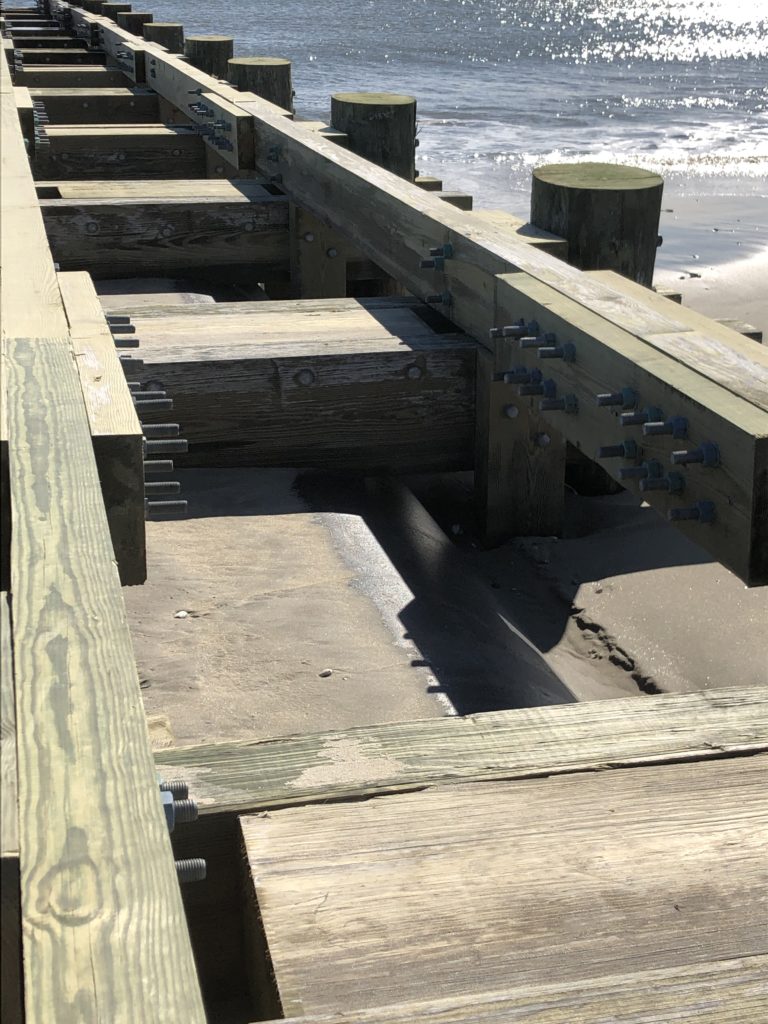Bolts protruding from the outfall pipe cages pose a danger to beachgoers, Margate officials say.
MARGATE The city will not accept responsibility for the final chapter in the three-year saga of the U.S. Army Corps of Engineers dune project until safety concerns are address, officials said Thursday, May 2.
The city has taken issue with the length of the bolts on the outfall system and believes that they pose a danger to the public, Mayor Michael Becker wrote in an April 29 letter to William Dixon, director of NJ Department of Environmental Protection Division of Coastal Engineering. Therefore, the city will not accept the project until the bolts have been cut to an acceptable length.
At issue is the length of bolts on five massive outfall pipe carriages that were installed to correct Margate's rudimentary stormwater management system that dumped rainwater onto the beach during rain events. The new system, which includes a lateral manifold system and five outfall pipes at Vendome, Nassau, Kenyon, Franklin and Douglas avenues, collects rainwater at the bulkhead and carries it out to sea. The 48-inch outfall pipes are wrapped with timbers that are held together with bolts that city officials believe could injure someone trying to cross over the apparatus.
The pipe installation was a permanent fix for excessive ponding that occurred behind the newly constructed berm and dune system during a severe rainfall in July 2017.
Commissioners and public safety officers have been investigating who is responsible for trimming the bolts to an acceptable length and have asked its Joint Insurance Fund representative to support the city's effort to get the bolts trimmed.
Bolts on the cages installed in Longport were trimmed by the contractor installing the cages there, Downbeach.com has learned.
Longport Public Works Supervisor Juergen Simmons confirmed in an email that borough personnel did not trim the bolts on the cages installed on Longport's beach, and Longport Engineer Richard Carter said that it was likely done by Walters Marine, the Army Corps' contractor.
According to a spokesman for the Army Corps, most of the work on the outfall system has been completed and the DEP was planning to turn over management of the system in late March or early April. However, checkmate valves will be installed inside the pipes during summer. The valves will prevent ocean water from backing up into the outfall pipe during extreme tides or storm events.
According to Stephen Rochette, the checkmate valves would be minimal impact work that could be completed during summer without much disruption for beachgoers.
Rochette said in March that the Army Corps provided information on low-cost options to cap the outfall splice joints and it would be up to the city to decide if it would do the work.
It's not being done as part of this contract, he said in March.
City Engineer Ed Dennis Jr. said the city was notified that the project would be turned over to the city, but the city has not signed any agreements to accept the project.
They've never resolved the bolt issue and there are some minor issues that need to be addressed, Commissioner John Amodeo said.
Amodeo said most of the grey stones that were left on the landward side of the dune in certain locations were the result of a sloppy job," and have been sifted out, but there are still some remaining, which could also pose a safety threat for beachgoers.
There's still a lot of stone, Amodeo said. They have to clean it up. It's a beach that did not have stones before, and could pose a danger to people walking in the sand.
Walters (Marine) told me today they have most of their equipment off the beach, Becker said.
According to Public Works Supervisor Frank Ricciotti most of the dune cross-overs have been scraped of blowing sand and that the city is ready to install the blue Mobi mats on both sides of the crossovers.
